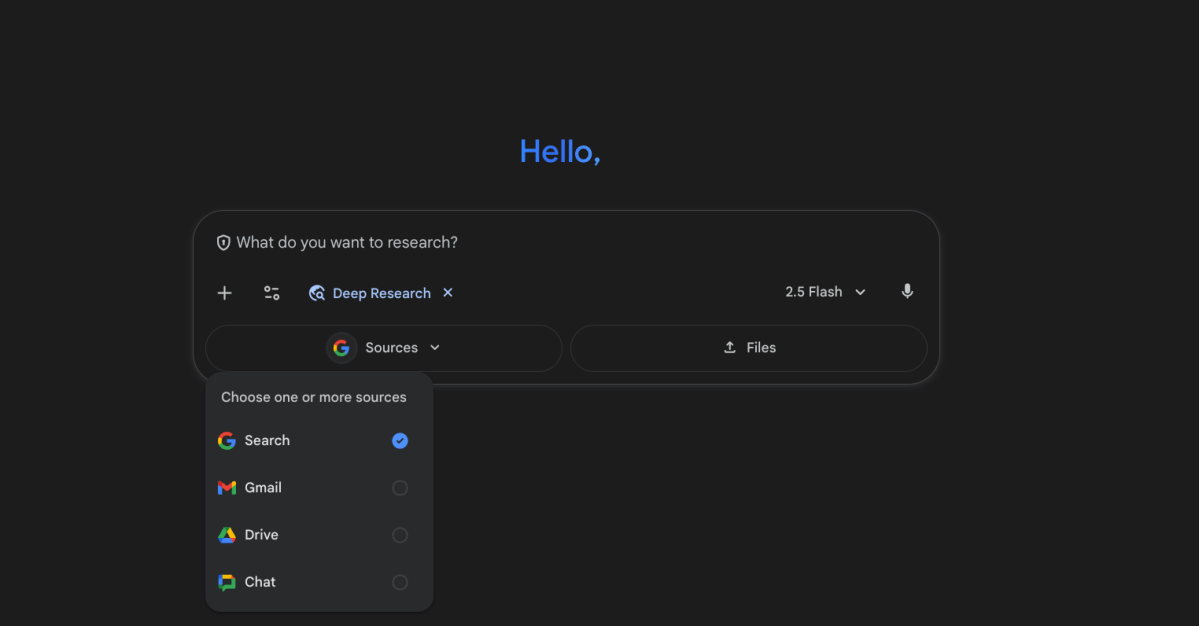Google Gemini’s Deep Research Now Harnesses Gmail, Drive, and Chat Data

Key Points
- Gemini Deep Research can now pull data from Gmail, Google Drive, and Google Chat.
- Users select which internal sources to include alongside web searches.
- The AI creates multi‑step research plans and generates comprehensive reports.
- Reports can be refined, exported to Google Docs, or turned into AI‑generated podcasts.
- Initially available on desktop, with mobile rollout planned soon.
Google has expanded its Gemini Deep Research feature to pull information directly from Gmail, Google Drive, and Google Chat. The AI can now analyze emails, documents, spreadsheets, slides, PDFs, and chat logs to generate multi‑step research reports. Users select which data sources to include, allowing the model to blend internal team content with web searches. The feature, initially available on desktop, aims to streamline market analysis, competitor reviews, and other research tasks, with plans to roll out to mobile devices soon.
Gemini Deep Research Extends Into Workspace Data
Google announced that its Gemini Deep Research capability will now access a user’s Gmail, Google Drive, and Google Chat content when generating research reports. The company described the update as one of the most‑requested features for the AI‑driven research tool, which is designed to create comprehensive reports rather than simply answering isolated questions.
When a user selects the “deep research” option in Gemini’s prompt bar, they can choose from four data sources: a standard Google Search, Gmail, Drive, and Chat. By enabling Gmail, the model can draw context from email threads; with Drive, it can read documents, slides, spreadsheets, PDFs, and other files; and with Chat, it can incorporate discussions from Google Chat. The AI then builds a multi‑step research plan, conducts web searches, and synthesizes a report that can be further refined or exported to a Google Doc or an AI‑generated podcast.
Practical Applications for Teams
The integration is positioned to help teams conduct market analyses, competitor assessments, and other strategic research tasks. For example, a user could ask Gemini to prepare a market analysis by analyzing brainstorming documents, related email conversations, and project plans stored in Drive. Similarly, a competitor report could be generated by cross‑referencing public web data with internal comparison spreadsheets and chat discussions. The AI’s ability to combine internal and external data aims to reduce manual effort and accelerate insight generation.
Rollout and Availability
At present, the enhanced Deep Research feature is available on desktop platforms, with Google indicating that a mobile rollout is forthcoming in the coming days. Users can initiate the feature from the Gemini prompt bar, select the desired data sources, and receive a research report that can be edited, tweaked, or exported as needed.
Implications for the Future of AI‑Powered Research
By linking Gemini directly to Workspace data, Google is blurring the line between AI assistants and traditional research workflows. The capability to automatically incorporate proprietary internal documents and communications into AI‑generated reports may streamline decision‑making processes across organizations. As the feature expands to mobile devices, it could further embed AI assistance into everyday productivity tools, making sophisticated research capabilities accessible from virtually any device.